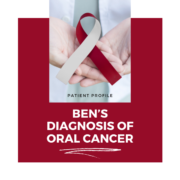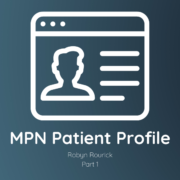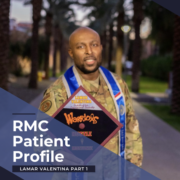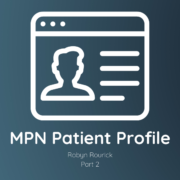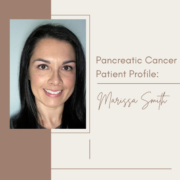Patient Profile: Ben’s Diagnosis of Oral Cancer
Ben has an amazing story. It’s a story of resilience, determination, hope, and perseverance. A story about gaining knowledge and actively participating in the treatment and care of his cancer. In short, this is the story of an Empowered Patient and how he fought for his own life.
Ben is a 35-year-old single male from New Zealand. A highly intelligent, successful professional whose storybook perfect life came to a sudden jolt in October 2018 when he was diagnosed with a cancer of the tongue. He underwent the surgery to remove most of his tongue, along with a dissection of the left side of the neck. A pathology result revealed a squamous cell carcinoma of the tongue. It also showed that 2 lymph nodes in the left side of his neck were positive for cancer. Per standard treatment protocol, Ben was given radiation therapy after the surgery without a concurrent chemotherapy. There is a growing evidence in the literature that, in such cases where the cancer had spread to the regional lymph nodes, post-surgery chemotherapy given concurrently with radiation therapy reduces the chance of the local recurrence of the disease. The obvious drawback being that, while this dual attack may be tougher on the cancer, it is also tougher on the patient. It is my hope that, someday, this standard protocol may change. However, as of right now, it still is the standard of treatment to give just radiation following surgery as it happened in Ben’s case. Unfortunately, it did not work so well.
Hardly six months after completing this treatment, he had a recurrence of cancer in the left side of his neck in the area of those positive lymph nodes six months ago. So, his cancer had come back. A second surgery was done to remove the cancerous lymph nodes followed by another radiation treatment. His first radiation treatment was given to both sides of his neck as it should’ve been. This time it was limited to the left side of the neck. This time, he did receive a chemo drug but for 2 doses only.
While he was recovering, Ben came across the story of Diana, as posted on PEN website. Ben happened to know Diana and thought that since Diana responded so well to Keytruda (Pembrolizumab), he would take Keytruda himself. He decided to pay for it out of his own pocket since it was not covered by the health plan. Keytruda is a wonderful medicine, but it’s not a magic pill or a cure-all and does not always work and did not in Ben’s case. About 4 months after finishing the radiation treatment, poor Ben had another recurrence of the cancer, this time on the right side of the neck. Naturally, he was devastated because he thought that Keytruda had failed him.
By this time, Ben and I had been talking about what he should do if the cancer were to came back again. Based upon the information derived from the literature, we felt that he had to have a full dose of chemotherapy concurrent with radiation, either without the surgery or following a surgery. Ben decided that he would like to have that lymph node removed and so the third surgery was performed.
Following the surgery, Ben underwent a concurrent administration of radiation and chemotherapy. He received Cisplatin, which is a very effective chemotherapy drug in the form of 6 weekly doses while also receiving radiation 5 days a week for 6 weeks. Treatments were completed around March of 2020.
It has been about 10 months since, as of February 2021 and, as far as we know, Ben is still cancer-free. For him, this is the longest remission so far. He feels healthy, strong & energetic and is working full-time and enjoying his life. The only problem is that he is so scared of finding another setback that he refuses to go for a follow-up scan, that was due long time ago. I continue to work with Ben to convince him to have the scan done because if the cancer comes back, the sooner we find it, the better we can attack it. I emphasize that another recurrence, while quite unsettling, will not be the end of the road for him and that newer & better treatment options are being discovered all the time.
Ben had to deal with a whole lot of other medical problems during the past couple of years. Problems that resulted from his cancer and/or his cancer treatments. He developed a great deal of difficulty with swallowing and speech after his tongue surgery, as expected.
Following his second surgery, Ben developed a paralysis of his left vocal cord. He could hardly speak beyond whispers. Our ability to produce voice is dependent upon the movement of the two vocal cords as they rhythmically move to midline to touch each other and then move apart. When one vocal cord is paralyzed and cannot move to midline, a firm contact between the 2 cords cannot be established, thus an ineffective voice.
Ben went to see an ear, nose, and throat doctor who injected a filler substance called Radiesse, into his paralyzed vocal cord. This is meant to thicken it so that the opposite & healthy vocal cord can make contact with the paralyzed one and produce sounds.
That procedure was less than satisfactory for Ben. His doctor recommended a bigger procedure, a surgery, called Medialization of the Vocal Cord. This involves pushing the paralyzed vocal cord towards the midline by stuffing something behind it. The doctor explained to Ben that he was not sure if this surgical procedure would work any better than the temporary injection of a filler. Luckily, I was able to help Ben. I agreed with his doctor that this surgery may not give a satisfactory result. I suggested that he should consider getting an additional surgical procedure, called Arytenoid Adduction. I had been through something similar. The problem with Ben’s vocal cords was not just the paralysis of the left vocal cord, but that both vocal cords were situated at an angle. So, when the doctor fattened the paralyzed vocal cord, it still could not make a firm enough contact with the healthy cord. Arytenoid Adduction surgery straightens the angle of the vocal cords and, combined with the medialization procedure, restores the near normal voice. However, it seemed that Ben’s ENT doctor was not very familiar with this procedure
So, while he was dealing with his other medical issues, Ben and I were working to find if there was a surgeon in New Zealand who would do the Arytenoid Adduction surgery. Finally, after Ben’s third surgery, when he seemed to be in remission, he decided to tackle the problem of his voice. He found the right surgeon and went for the surgery. It did not go well.
A most unfortunate complication occurred while undergoing anesthesia and Ben stopped breathing. He had to be resuscitated and an opening was created in his trachea to enable him to breathe. Obviously, the surgery was abandoned with the recommendation that it be attempted again after a few weeks or months.
Ben, being a very smart person, wondered if now would be the better time for the surgery while he still had the opening in his trachea to prevent a similar complication. I wholeheartedly agreed with his reasoning and suggested that he present it to his doctors. So, he had the second surgery done within 10 days. There were no complications with his breathing this time because he already had an opening in his trachea. The surgery was successfully performed. The trachea opening was closed and Ben has a nice and clear voice now which he is very happy about.
His bad luck did not stop though because somewhere along the way, he also developed a severe stomach issue called Gastric Dumping Syndrome due to a possible nerve damage during the neck surgery. This condition causes nausea, bloated feeling, abdominal pain and diarrhea. Luckily, as it often happens in these cases, after some time, his stomach regained its function.
As is often the case in cancer patients, Ben has suffered from periods of depression. He has handled it very well by seeking the professional help and taking antidepressant medicines. He has valiantly fought through all of his challenges with his intelligence, determination, knowledge, and persistence.
I think that we all need to admire Ben’s tenacity and his never-ending hope. Recently, he has had genomic studies done on his cancer. Based on the result of those tests, we know that there are certain mutations of the cancer that can be targeted if and when it rears its’ ugly head again. We have options if needed.
So, this is the story of a truly empowered patient and how he has changed his prognosis and the course of his illness often as a result of his own initiative. Not only by cooperating with his doctors, but becoming more knowledgeable about his illness and actively participating in his treatment decisions. This activism as a patient has often led to a better treatment outcome.
This is what Patient Empowerment Network is all about. Hope, determination and knowledge. Remember, the knowledge is your superpower.
Disclaimer: Sajjad Iqbal, MD is a retired physician and rare cancer survivor who routinely supports, mentors and guides other patients through their perilous cancer journeys. Any opinions, suggestions, or advice provided is solely from Dr. Iqbal’s perspective as a well-informed and knowledgeable cancer patient, not as a physician. The patients must discuss their health with their own doctors and follow their advice.
Sajjad Iqbal is a physician and cancer survivor. Almost 17 years ago, Sajjad learned that he had an extremely rare and most malignant type of parotid cancer called Salivary Duct Carcinoma. He was given a 30% chance of surviving for 2 years. Because of Sajjad’s medical training and his unwavering sense of hope & determination, he was no ordinary patient. Sajjad researched his condition and proposed a treatment method for himself that stopped the progression of cancer cells. Although Sajjad is still living with, and still fighting, the cancer, he continues to defy the odds with no end in sight. To inspire other cancer patients, Sajjad Iqbal has chronicled his amazing cancer journey in the form of a book titled, “Swimming Upstream, My Struggle and Triumph over Cancer and Medical Establishment.”

